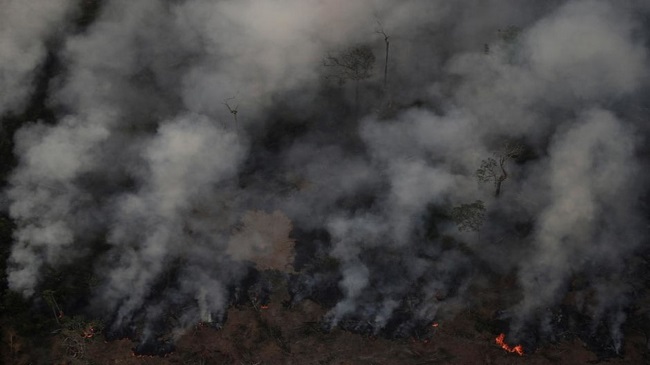As Brazil looks ahead to the start of another deadly burning season, researchers on Tuesday, June 23, 2020 presented solutions for combating tropical forest fires, with tactics rooted in the experiences of indigenous firefighting experts from the Brazilian Amazon and Guatemala’s Mayan Biosphere Reserve.

In Guatemala, the fire season is over, and preliminary findings suggest the communities with concessions in the Mayan Biosphere have lessons for other tropical forest regions, according to Erick Cuellar, representative of the Mayan communities of ACOFOP in the Mayan Biosphere. In 2020, the concessions once again reported zero wildfires. Meanwhile, forest fires outside the concessions – 90 percent of which are caused by humans – continued to burn.
“The year 2020 was the driest yet, but so far our firefighters report no fires,” Cuellar said. “Our challenge now is to convince our government to renew the concessions that guarantee our success. The lands to which we have rights are free of fires, coronavirus, and narco-traffickers. Worldwide, we are known as the best guardians of our forests and creators of a renowned model for sustainable development. The story of our success is our gift to the world.”
A growing body of peer-reviewed evidence suggests that granting land rights to tropical forest communities, and strengthening their capacity to manage sustainable enterprises, also leads to less deforestation and biodiversity loss.
Increasingly, members of Indigenous and other forest communities, armed with new technologies like drones, satellites and mobile GPS systems, have become adept at monitoring and reporting activities in the forests they protect.
Nonetheless, tropical forest communities in Central and South America face significant obstacles, as outsiders seek to take their lands and engage in activities that put forests and other ecosystems at risk.
In 2019, Daniel Javaé, an indigenous fire fighter, led a team whose job was to prevent and combat fires on Amazonian territories managed by two ethnicities whose rights have been recognised by the government. The firefighters use modern methods like GPS to identify hotspots, but they have drawn as well from the wisdom of their elders, Javaé said. He now works on training community leaders in how to prevent the spread of COVID-19.
“We are known for our success in fighting the fires,” Javaé said, “But a lot of people are now worried that this year people will be scared to join the brigades, out of fear they might get exposed to the virus.”
Like the novel coronavirus, most of the threats endangering Indigenous Peoples and local communities invade the territories from outside. Miners, ranchers, narco-traffickers, and others engage in often illegal activities that put vulnerable ecosystems at risk. In Brazil, climate change, illegal land grabbing, and controversial government policies aimed at opening up indigenous lands to development, are said to be undermining the traditional roles of the country’s forest peoples, according to Marcia Macedo, an ecosystem ecologist at the Woods Hole Research Centre.
Yet Macedo, co-author of a new paper, “Amazon wildfires: Scenes from a foreseeable disaster,” argues that Brazil could repeat its historic success with preventing fires, reducing emissions, and curbing deforestation.
To do so, however, would require political will and investments in innovative strategies to combat the effects of climate change. Macedo and her co-authors suggest that recent droughts have made the southern Amazon “more flammable and vulnerable to wildfires…” Preventing fires in this context requires strong leadership and effective coordination among government agencies and traditional communities.
“We need to move fast,” Macedo said. “And to succeed, we need to show the country’s powerful political and economic actors that if the Amazon disappears, so will the agro-industry our country depends on. Indigenous Peoples have kept the Amazon from hitting a tipping point, but they are now faced with climate change, coronavirus, and government policies that are putting them at risk. They too need our support.”
Andrew Davis, a researcher with the Prisma Foundation in El Salvador, has studied the 2.1 million-hectare (5.2 million-acre) Mayan Biosphere in northern Guatemala, which is threatened not only from forest fires, but also from drug traffickers and growing pressure from powerful foreign and Guatemalan actors.
“From studying the concessions on 20 percent of the biosphere, we know that ACOFOP represents the last bastion of forest conservation in Guatemala,” Davis said. “The concessions are surrounded by forests that have been decimated by illegal activities, including narco-trafficking and forest fires.”
Most recently, peer-reviewed research papers have reported ACOFOP’s significant success in resisting narco-traffickers, who have burned down surrounding forests in the Mayan Biosphere to raise the cattle they use to launder money.
“What Guatemala can give the world is a formula for success in creating a world-renowned sustainable development model that provides a way of life and livelihoods for the communities,” Davis said. “The key is to start with strong rights.”
Also necessary are to:
- Integrate local practices with government policy (move beyond suppression and conflict), and invest in coordination, collaboration and technology used by governments and communities.
- Stop the incursion of outsiders who would benefit from setting forest fires (ranchers, illegal groups).
- Invest in sustainable community models, viable economic systems that allow communities to live well and invest in the control and defense of their territory.
“What the communities of ACOFOP show us is that all these elements together have created a model for advancing global goals for addressing climate change, poverty, biodiversity loss and the deforestation that seems to enable the emergence of dangerous pathogens,” Davis said.
“Two decades ago, the Government of Guatemala started this process when it agreed to grant the concessions to the communities of the Mayan Biosphere. In doing so, the country’s leaders gave ACOFOP, aid agencies and donors from Guatemala and a number of other countries a chance to come up with a solution for reversing the destruction of tropical forests and so much more.”
To keep this dream alive will require a global campaign,” Davis said. “It will take a powerful force to push back against efforts to destroy what has been built with so much care.”
